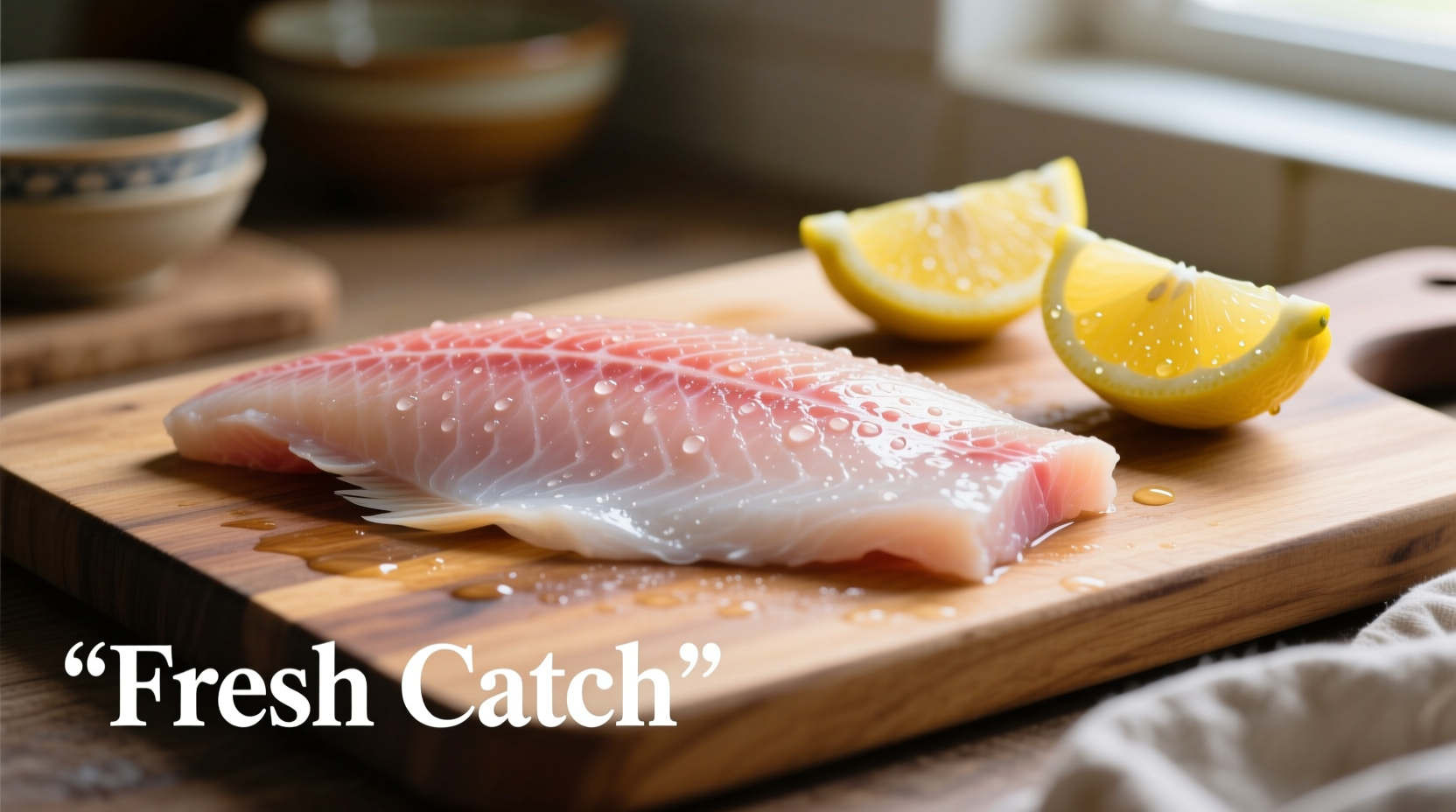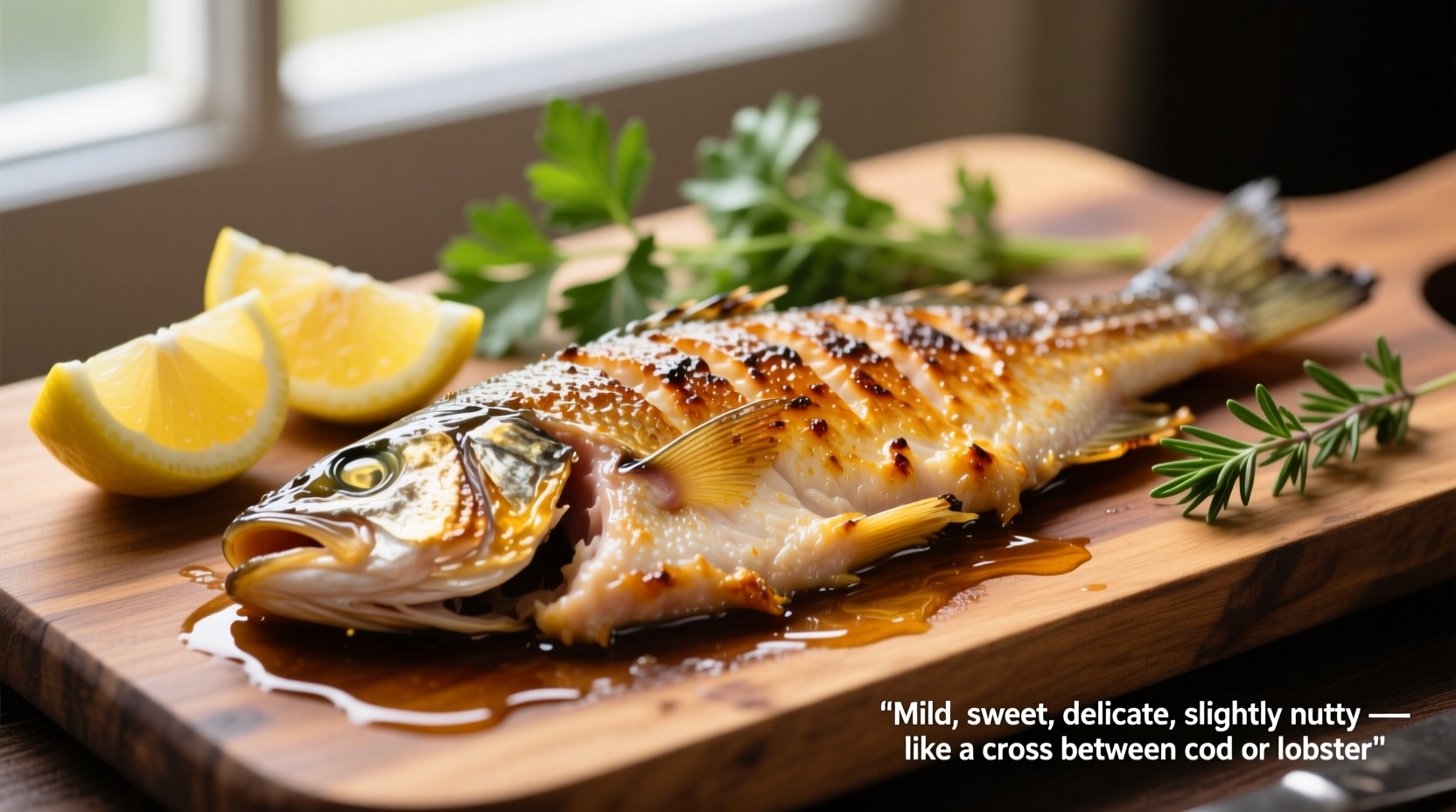When you're standing at the seafood counter wondering what does grouper taste like, you're probably trying to decide if it's right for your next meal. As a chef who's worked with this fish across countless menus, I can tell you grouper delivers a perfect balance that appeals to both seafood enthusiasts and those hesitant about 'fishy' flavors.
Understanding Grouper's Flavor Profile
Grouper occupies a sweet spot in the seafood spectrum—more substantial than flounder but less assertive than tuna. Its white flesh remains moist when cooked properly, with large, distinct flakes that hold together well. The subtle sweetness becomes more pronounced when grilled or pan-seared, while baking preserves its delicate nature.
Unlike stronger-flavored fish like mackerel or bluefish, grouper won't overpower your palate. This makes it an excellent choice for family meals where you might have varying seafood preferences. Many first-time grouper eaters describe it as "the gateway fish" because of its approachable flavor.
Grouper Compared to Popular Seafood Options
Understanding how grouper stacks up against other common fish helps set proper expectations. This comparison shows where grouper fits in the seafood flavor spectrum:
| Fish Type | Flavor Intensity | Texture | Best Cooking Methods |
|---|---|---|---|
| Grouper | Mild to moderate | Firm, large flakes | Grilling, baking, pan-searing |
| Snapper | Mild | Firm but smaller flakes | Grilling, blackening |
| Salmon | Strong | Buttery, rich | Grilling, roasting |
| Cod | Very mild | Flaky, delicate | Frying, baking |
| Tuna | Robust | Dense, meaty | Seared, raw preparations |
This comparison reveals why many chefs consider grouper the ideal compromise between delicate white fish and meatier options. Its moderate flavor intensity means it won't overwhelm accompanying ingredients, yet it has enough substance to stand up to bolder sauces and seasonings.
How Cooking Method Affects Grouper's Flavor
The preparation technique significantly influences what grouper tastes like in your final dish. Understanding these variations helps you choose the right method for your desired outcome:
- Grilled grouper develops a subtle smokiness that enhances its natural sweetness while maintaining firm texture
- Pan-seared grouper creates a delicate crust that locks in moisture, resulting in a buttery interior
- Baked grouper preserves the most delicate flavor profile, ideal for subtle herb preparations
- Blackened grouper transforms the mild fish with bold spices while the interior remains tender
According to the NOAA Fisheries database, grouper's versatility stems from its relatively low oil content (about 2-3%) compared to fattier fish like salmon (10-14%). This characteristic makes it particularly receptive to absorbing flavors from marinades and seasonings without becoming greasy.

Seasonal Flavor Variations in Grouper
Grouper's taste profile changes throughout the year based on spawning cycles and feeding patterns. Understanding these variations helps you select the best fish for your needs:
- Spring through early summer: Grouper tends to be leaner with the most delicate flavor as they prepare for spawning
- Late summer to fall: Fish accumulate more fat reserves, resulting in slightly richer flavor and more succulent texture
- Winter months: Generally considered peak season when grouper has optimal fat content and firm texture
When evaluating freshness, look for firm flesh that springs back when pressed, clear eyes in whole fish, and a clean ocean smell rather than strong 'fishy' odor. The FDA seafood guidelines confirm that properly handled grouper should never have an ammonia-like smell, which indicates spoilage.
Perfect Pairings for Grouper's Flavor Profile
What does grouper taste like when paired with complementary ingredients? Its mild nature makes it incredibly versatile:
- Citrus accents: Lemon, lime, or orange enhance grouper's natural sweetness without overwhelming it
- Herb combinations: Thyme, rosemary, and parsley work particularly well with its subtle flavor
- Mild sauces: Beurre blanc, light tomato sauces, or simple olive oil preparations showcase rather than mask the fish
- Wine pairings: Crisp white wines like Sauvignon Blanc or unoaked Chardonnay complement without competing
For those wondering what does red grouper taste like specifically versus other varieties, the difference is subtle but noticeable. Red grouper has a slightly sweeter profile and more delicate texture than its black grouper counterpart, which tends to be meatier with a more pronounced flavor.
Sustainability Considerations When Choosing Grouper
When exploring what does grouper taste like, it's worth considering sustainability factors that affect availability and quality. According to the NOAA FishWatch program, some grouper species face overfishing concerns while others remain well-managed.
Gag grouper from the Gulf of Mexico and red grouper from the South Atlantic currently receive 'Best Choice' ratings, meaning they're abundant and caught using methods that minimize environmental impact. Choosing sustainably sourced grouper ensures better quality and supports healthy ocean ecosystems.
Common Questions About Grouper's Taste
Many home cooks have specific questions about what to expect when preparing grouper for the first time:
- Does grouper taste fishy? Properly fresh grouper has minimal fishiness—more comparable to chicken than stronger-flavored fish
- How does grouper compare to sea bass? Grouper has a firmer texture and slightly sweeter flavor than most sea bass varieties
- Why does my grouper taste bland? Overcooking is the most common culprit—it should be moist and flake easily when done properly
- Does grouper have a lot of bones? Most commercially available fillets are boneless, though some larger varieties may have pin bones
Understanding what does grouper taste like helps you make informed choices at the market and create delicious dishes that showcase this versatile fish. Whether you're a seafood novice or experienced cook, grouper's balanced flavor profile makes it a reliable choice for countless preparations.
Does grouper have a strong fishy taste?
No, fresh grouper has a mild, slightly sweet flavor with minimal fishiness. Its clean taste makes it one of the least 'fishy' tasting seafood options, appealing even to those who typically avoid strong seafood flavors.
How does grouper compare to cod in terms of flavor?
Grouper has a slightly stronger flavor and firmer texture than cod. While cod is very mild and delicate, grouper offers more substance while still maintaining a clean, sweet profile that works well with various cooking methods.
What's the best way to cook grouper to enhance its natural flavor?
Pan-searing with minimal seasoning allows grouper's natural sweetness to shine. Heat oil in a skillet until shimmering, season the fish simply with salt and pepper, and cook for 3-4 minutes per side until golden and flaky. Finish with a squeeze of fresh lemon.
Why does my cooked grouper taste dry?
Grouper becomes dry when overcooked. It should reach an internal temperature of 135-140°F (57-60°C) and continue cooking slightly from residual heat. Properly cooked grouper will flake easily with a fork while remaining moist throughout.
Does the size of grouper affect its taste?
Yes, smaller grouper (under 10 pounds) typically have more delicate flavor and tender texture. Larger fish can develop stronger flavors and slightly coarser texture, though they're still excellent for grilling or chowders where robust flavor is desirable.











 浙公网安备
33010002000092号
浙公网安备
33010002000092号 浙B2-20120091-4
浙B2-20120091-4